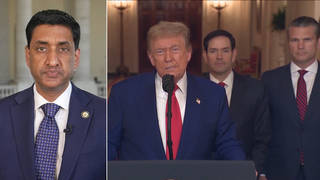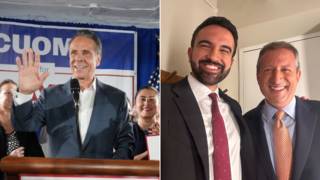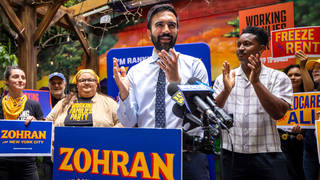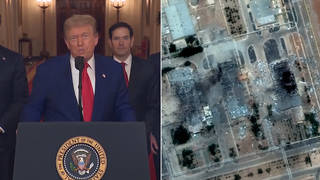This content originally appeared on Democracy Now! and was authored by Democracy Now!.
This post was originally published on Radio Free.
This content originally appeared on Democracy Now! and was authored by Democracy Now!.
This post was originally published on Radio Free.
This content originally appeared on Democracy Now! and was authored by Democracy Now!.
This post was originally published on Radio Free.
This content originally appeared on Democracy Now! and was authored by Democracy Now!.
This post was originally published on Radio Free.
This content originally appeared on Democracy Now! and was authored by Democracy Now!.
This post was originally published on Radio Free.

“You can’t, as the president, engage in strikes on a foreign country when there’s no imminent threat, without coming to Congress for authorization,” says Ro Khanna, Democratic congressmember and member of the House Armed Services Committee, criticizing President Trump’s decision to bomb Iran’s nuclear sites as “blatantly unconstitutional” and a clear instance of executive overreach. Khanna and Republican congressmember Thomas Massie recently introduced a bipartisan Iran War Powers resolution in a bid to prevent further U.S. involvement in the Iran-Israel conflict. Khanna shares how anti-war voices in U.S. politics are too often silenced by powerful and wealthy interest groups and urges the Democratic Party to harness widespread anti-war sentiment in opposition to Trump’s increasingly authoritarian foreign policy.
This content originally appeared on Democracy Now! and was authored by Democracy Now!.
This post was originally published on Radio Free.

Tuesday’s New York City mayoral primary could determine the future of the most populous city in the United States. We speak to John Tarleton, editor-in-chief of the The Indypendent, about the race, which pits the young, progressive socialist Zohran Mamdani against Andrew Cuomo, an establishment Democrat and the former state governor who resigned in 2020 amid an investigation into allegations of sexual harassment. Tarleton discusses Mamdani’s unique grassroots campaign, the influence of the powerful real-estate industry and why everything may come down to New York City’s ranked-choice voting system.
This content originally appeared on Democracy Now! and was authored by Democracy Now!.
This post was originally published on Radio Free.

Tuesday’s New York City mayoral primary could determine the future of the most populous city in the United States. We speak to John Tarleton, editor-in-chief of the The Indypendent, about the race, which pits the young, progressive socialist Zohran Mamdani against Andrew Cuomo, an establishment Democrat and the former state governor who resigned in 2020 amid an investigation into allegations of sexual harassment. Tarleton discusses Mamdani’s unique grassroots campaign, the influence of the powerful real-estate industry and why everything may come down to New York City’s ranked-choice voting system.
This content originally appeared on Democracy Now! and was authored by Democracy Now!.
This post was originally published on Radio Free.

Today’s mayoral primary in New York City features two very different frontrunners, the scandal-ridden former governor of New York, Andrew Cuomo, and the young Democratic Socialist state assemblymember, Zohran Mamdani. Mamdani’s ascendant grassroots campaign has taken the Democratic establishment by surprise. He last appeared on Democracy Now!in October, as he launched his campaign centered on bringing down the high cost-of-living for working-class New Yorkers. On the campaign trail today, he joins us again as polls place him neck-and-neck with Cuomo, to share why his campaign and candidacy has resonated with so many. “This race is one way in which we can show that we can actually deliver a city that New Yorkers can afford, and we can do so by building a movement the city has never seen before.”
This content originally appeared on Democracy Now! and was authored by Democracy Now!.
This post was originally published on Radio Free.

Today’s mayoral primary in New York City features two very different frontrunners, the scandal-ridden former governor of New York, Andrew Cuomo, and the young Democratic Socialist state assemblymember, Zohran Mamdani. Mamdani’s ascendant grassroots campaign has taken the Democratic establishment by surprise. He last appeared on Democracy Now!in October, as he launched his campaign centered on bringing down the high cost-of-living for working-class New Yorkers. On the campaign trail today, he joins us again as polls place him neck-and-neck with Cuomo, to share why his campaign and candidacy has resonated with so many. “This race is one way in which we can show that we can actually deliver a city that New Yorkers can afford, and we can do so by building a movement the city has never seen before.”
This content originally appeared on Democracy Now! and was authored by Democracy Now!.
This post was originally published on Radio Free.

U.S. President Donald Trump is touting a ceasefire deal between Israel and Iran, despite what he said were violations of the deal by both sides shortly after he announced it. Trump said he was especially angry with Israel and urged the country to stand down as he faces mounting criticism over the prospect of another U.S. war in the Middle East. “Part of the reason why Trump also was quite eager to get to a ceasefire, why he’s so frustrated with what the Israelis are doing right now, is precisely because he’s very much aware of the strain that all of this has caused within his own support base,” says political analyst Trita Parsi. Parsi says the breakdown of the global Non-Proliferation Treaty on nuclear weapons could lead to dangerous consequences, as countries like Iran see incentive to build their own nuclear deterrence.
This content originally appeared on Democracy Now! and was authored by Democracy Now!.
This post was originally published on Radio Free.

U.S. President Donald Trump is touting a ceasefire deal between Israel and Iran, despite what he said were violations of the deal by both sides shortly after he announced it. Trump said he was especially angry with Israel and urged the country to stand down as he faces mounting criticism over the prospect of another U.S. war in the Middle East. “Part of the reason why Trump also was quite eager to get to a ceasefire, why he’s so frustrated with what the Israelis are doing right now, is precisely because he’s very much aware of the strain that all of this has caused within his own support base,” says political analyst Trita Parsi. Parsi says the breakdown of the global Non-Proliferation Treaty on nuclear weapons could lead to dangerous consequences, as countries like Iran see incentive to build their own nuclear deterrence.
This content originally appeared on Democracy Now! and was authored by Democracy Now!.
This post was originally published on Radio Free.
Democracy Now! Tuesday, June 24, 2025
This content originally appeared on Democracy Now! Audio and was authored by Democracy Now!.
This post was originally published on Radio Free.
This content originally appeared on Democracy Now! and was authored by Democracy Now!.
This post was originally published on Radio Free.
This content originally appeared on Democracy Now! for Broadcasters – HD MP4 and was authored by Democracy Now! for Broadcasters – HD MP4.
This post was originally published on Radio Free.
This content originally appeared on Democracy Now! and was authored by Democracy Now!.
This post was originally published on Radio Free.
This content originally appeared on Democracy Now! and was authored by Democracy Now!.
This post was originally published on Radio Free.
This content originally appeared on Democracy Now! and was authored by Democracy Now!.
This post was originally published on Radio Free.
This content originally appeared on Democracy Now! and was authored by Democracy Now!.
This post was originally published on Radio Free.
This content originally appeared on Democracy Now! and was authored by Democracy Now!.
This post was originally published on Radio Free.
This content originally appeared on Democracy Now! and was authored by Democracy Now!.
This post was originally published on Radio Free.
This content originally appeared on Democracy Now! and was authored by Democracy Now!.
This post was originally published on Radio Free.
This content originally appeared on Democracy Now! and was authored by Democracy Now!.
This post was originally published on Radio Free.

Democracy Now! was there when Palestinian activist Mahmoud Khalil reunited with his family over the weekend after being released on bail by a federal judge Friday, ending his detention in a Louisiana ICE jail after more than 100 days. Khalil was seized by federal agents at his home in New York on March 8, with the Trump administration seeking to deport him even though he is a legal permanent resident with a green card and married to a U.S. citizen. Khalil’s wife Noor Abdalla was eight months pregnant at the time of the arrest and gave birth to their son while he was jailed. “I just want to go back and continue the work I was already doing, advocating for Palestinian rights,” says Khalil, who played a prominent role in the Palestine solidarity protests at Columbia University last spring. He addressed over 1,000 supporters at a rally Sunday before leading a march to the gates of the school. We feature part of Khalil’s comments and also hear from Democratic Congressmember Alexandria Ocasio-Cortez, and members of Khalil’s legal team.
This content originally appeared on Democracy Now! and was authored by Democracy Now!.
This post was originally published on Radio Free.

“Netanyahu’s purpose was to drag Trump in,” Daniel Levy, a former Israeli peace negotiator, says of the U.S. attack on Iran. Over the weekend, the U.S. directly joined the war between Israel and Iran when it bombed three nuclear facilities at Fordow, Natanz and Isfahan, though it’s unclear how far the strikes have set back the Iranian nuclear program. Israel and the United States accuse Iran of developing nuclear weapons, while Iran says its program is for civilian use. United Nations inspectors and U.S. intelligence assessments have said Iran is not building weapons. “The danger now is that, having brought the U.S. into this, Israel will seek to go further up the escalatory ladder,” says Levy. “It wants the chaos.”
This content originally appeared on Democracy Now! and was authored by Democracy Now!.
This post was originally published on Radio Free.

Israel and Iran continue to exchange fire, just days after the United States entered the war by bombing three key nuclear sites in Iran on Saturday. President Trump ordered the attack on the Fordow, Natanz and Isfahan facilities without seeking congressional approval, in a move that could spread further violence across the Middle East. We speak with two Iranian scholars who have taken part in the country’s previous nuclear negotiations. “Iranians see the United States as the aggressor, as helping the Israeli regime slaughter Iranians,” says University of Tehran professor Mohammad Marandi. “There’s anger across the board.” The U.S. and Israeli strikes on Iran are an “obvious” and “clear violation of international law and regulations,” says Seyed Hossein Mousavian, a visiting researcher at Princeton University who served as spokesperson for Iran in its nuclear negotiations with the European Union from 2003 to 2005.
This content originally appeared on Democracy Now! and was authored by Democracy Now!.
This post was originally published on Radio Free.
Democracy Now! Monday, June 23, 2025
This content originally appeared on Democracy Now! Audio and was authored by Democracy Now!.
This post was originally published on Radio Free.
This content originally appeared on Democracy Now! and was authored by Democracy Now!.
This post was originally published on Radio Free.
This content originally appeared on Democracy Now! for Broadcasters – HD MP4 and was authored by Democracy Now! for Broadcasters – HD MP4.
This post was originally published on Radio Free.